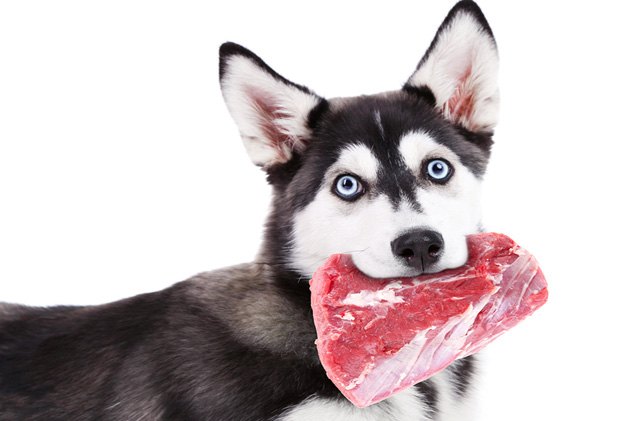Why is Protein Essential in a Dog’s Diet?

All animals require a balance of protein, fat, and carbohydrate in their diet but the ratios vary from one species to another. While the average diet for humans is largely carbohydrate-based, protein is the most essential nutrient for dogs. Keep reading to learn more about the role protein plays in your dog’s diet and to find out which protein sources are the best for your dog.
Why Do Dogs Need Protein?
Dogs are carnivorous by nature, though not strictly so. Cats are called obligate carnivores because their bodies are adapted to digesting and utilizing animal-based foods more than plant-based foods. To a lesser degree, the same is true for dogs, though they are better able to digest certain plant products than cats are.
Related: 5 Benefits of Feeding Your Dog a Raw Diet
Still, in order for your dog to remain healthy, most of the ingredients in his food should come from animal sources and protein is the most important nutrient in his diet. If you come across a dog food product that doesn’t list some kind of meat as the first ingredient (or heaven forbid a vegetarian or vegan formula), run the other way!
Protein is made up of amino acids – these are organic compounds that play an important role in a number of essential bodily processes. Dogs need a total of 22 different amino acids in their diet, though their bodies are capable of synthesizing (producing) 12 of them. The remaining 10 are called essential amino acids because they must come from your dog’s diet.
While some plant-based proteins (like those you would find in beans and legumes) contain one or more of these essential amino acids, only animal proteins (like meat, poultry, fish, and eggs) contain all 12 – that is why animal proteins are sometimes called “complete” proteins. In your dog’s body, these proteins help to build healthy cells, tissues, and organs – they also help with the production of hormones, enzymes, antibodies and more.
Related: Unique Protein Diets That Benefit Your Dog’s Wellbeing
Best Protein Sources for Dogs
Your dog’s need for protein will change a little bit throughout his life, but the best sources for that protein will not. As a puppy, your dog’s diet should be comprised of at least 22% protein but, as an adult, he only needs a minimum of 18%. Keep in mind that these are both minimums – the more protein in your dog’s diet the better, as long as it doesn’t become excessive in terms of calorie content.
The best protein sources for dogs are animal-based proteins like meat, poultry, fish, and eggs – this includes things like chicken, turkey, beef, lamb, salmon, tuna, and more. In terms of the biological value of different proteins for dogs, the order is as follows: egg whites, muscle meats, organ meats, fish. Muscle meats include fresh meat from sources like chicken, lamb, and beef while organ meats include things like kidney, heart, and liver – your dog needs both for a balanced diet.
Your dog will not thrive on a diet of meat alone but protein is by far the most important nutrient in a healthy and balanced diet for dogs. When shopping for dog food, make sure that the product is largely meat-based with plenty of animal-based protein but also balanced in terms of fat, carbohydrate, and other essential nutrients.

Kate Barrington is the loving owner of two cats (Bagel and Munchkin) and a noisy herd of guinea pigs. Having grown up with golden retrievers, Kate has a great deal of experience with dogs but labels herself a lover of all pets. Having received a Bachelor's degree in English, Kate has combined her love for pets and her passion for writing to create her own freelance writing business, specializing in the pet niche.
More by Kate Barrington























